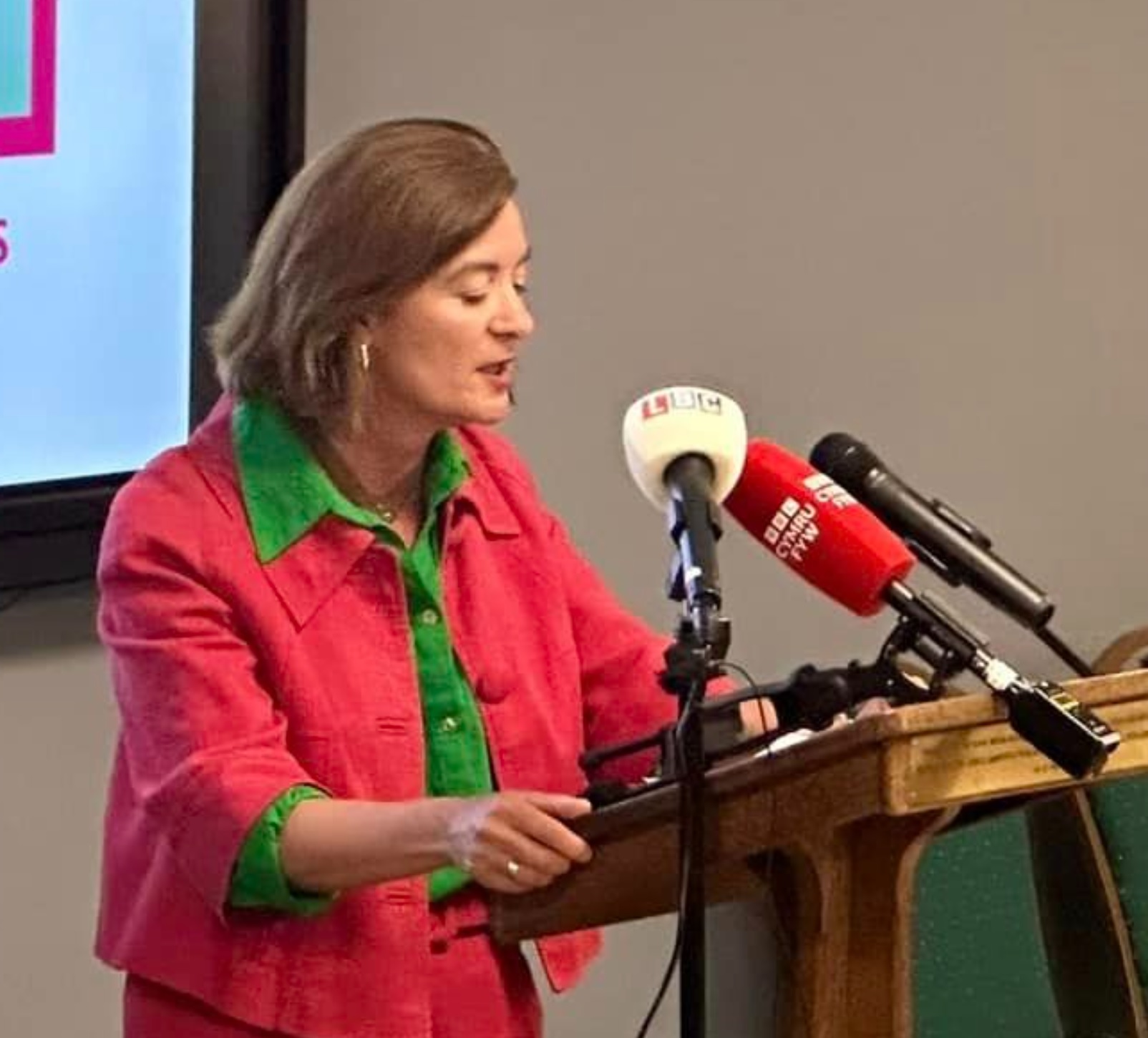News
Chief legal officer grilled about Senedd reforms and closed-list electoral system

MSs grilled Mick Antoniw, Wales’ chief legal officer, about plans to reform the Senedd amid concerns about “no evidence” in support of the proposed closed-list electoral system.
Under the Senedd Cymru (Members and Elections) bill, the Welsh Parliament would increase in size from 60 to 96 members.
A closed-list system would be used for future Senedd elections, meaning the electorate would vote for parties rather than people.
And the 32 constituencies that will be used in the next UK general election will be paired to create 16 for the 2026 Senedd poll, with each returning six members.
Jane Dodds, the Lib Dems leader in Wales, said the Senedd reform committee’s inquiry has heard no evidence from witnesses in support of a closed-list system.
She suggested the system was imposed on a previous committee, with agreement reached behind closed doors between the first minister and Adam Price, Plaid Cymru’s former leader.
Mr Antoniw argued people in Wales are already familiar with closed lists as they are an extension of the current additional member system.
He said reformed elections would be fully proportional, bringing about a much fairer result.
Mr Antoniw criticised the first-past-the-post system used in Westminster elections.
He stressed that compromise is necessary because the bill will require a supermajority of two-thirds support to pass in the Senedd.
The counsel general disagreed with Prof Laura McAllister, who has warned closed lists are dangerous, arguing the proposed changes are a step forward.
Ms Dodds said: “I’m still unclear about the democratic benefits of a closed-list system.”
The Conservatives’ Darren Millar agreed, arguing that such a system would lead to less democratic accountability as he added his voice to calls for an open, flexible-list approach.
Powers
David Rees, who chairs the reform committee, asked about plans for a 40% increase in the number of ministers from 12 to 17, not including the counsel general and first minister.
Mr Antoniw said the increase was a recommendation from the previous committee due to the additional responsibilities gained by the Senedd in recent years.
He told members there is a need for greater ministerial accountability and accessibility, with the Welsh Government planning for the devolution of parts of the justice system.
Pressed on powers in the bill for 19 ministers in future, Mr Antoniw stressed that the Welsh Government would become smaller as a proportion of the Senedd than currently.
He told the committee the powers would require MSs’ consent.
‘Political gain’
Mr Rees warned that the two extra two ministerial positions could be used as part of bargaining around a coalition after an election.
He said: “It’s not really a requirement of function or need – it’s more a requirement of political gain,” suggesting that a two-thirds majority should be required for the powers.
Mr Antoniw pointed out that no party has held a majority since the Senedd was founded in 1999 and the powers could give stability to the government by facilitating cooperation.
He said: “I’m speculating that that might happen, it may well never, but it is not the core purpose of the need to increase ministerial capacity.”
Vacancies
Asked how empty seats would be filled, Mr Antoniw described the chances of problems arising as remote despite a high turnover of members during the previous Senedd term.
He explained that the next person on the party’s eight-name list would be elected but the bill does not provide a mechanism for replacing an independent member.
He cautioned that holding by-elections would “sacrifice” the proportionality of the system.
Mr Rees pointed out that any by-election can change the balance of a parliament.
The Labour backbencher also raised concerns about the lack of a recall system if, as an example, a member was involved in crime.
Mr Antoniw said there is no simple way of including a recall system in the legislation, saying the Welsh Government will consider the standards commissioner’s recommendations.
Constituencies
Darren Millar questioned the 10% margin in the number of voters for each constituency, which is twice as much as allowed for Westminster elections.
The Conservative said the electorate could vary by as much as 30,000 voters between constituencies from 2030, giving some more or less of a democratic say than others.
Mr Millar, who resigned from a previous reform committee, also raised concerns about a 12-13% threshold to be elected – almost twice as much as currently.
Mr Antoniw told MSs that the 10% margin was chosen to give greater flexibility for the new Democracy and Boundary Commission Cymru.
“The intention isn’t to create constituencies of different sizes,” he said.
Residency
Mr Millar criticised the use of council electoral registers in the eligibility criteria for candidates, warning that the rules could be circumvented.
Mr Antoniw recognised concerns about second home owners or people moving after being elected but he cautioned that ministers cannot allow for every contingency.
“No system is absolutely perfect,” he said.
He told MSs that using the electoral register is the most logical, clear and simple system, creating as few loopholes as possible. He argued against calls for a grace period.
Asked about the tight timetable, the counsel general said everything must be in place six months before the 2026 Senedd election.
At the end of the committee meeting on Wednesday December 13, Mr Antoniw said: “I’m looking forward to not discussing closed lists over the Christmas period.”
News
Paris in February made easy with special direct Air France flights from Cardiff

TRAVELLING to Paris has never been simpler for Welsh holidaymakers, with Air France launching a series of special direct weekend services from Cardiff Airport to the French capital this month.
The limited-period flights offer a convenient, non-stop journey of under two hours to Paris, giving passengers more time to enjoy the city’s culture, cuisine and famous landmarks without the hassle of connections or long road transfers to other UK airports.

Timed perfectly for winter city breaks and Valentine’s getaways, the services run between February 13 and February 16, making them ideal for long weekends.
February is widely considered one of the best times to visit the French capital, with fewer crowds and a relaxed, romantic atmosphere. Visitors can explore world-famous attractions including the Eiffel Tower, the Arc de Triomphe and Notre-Dame Cathedral, browse galleries at the Louvre and Musée d’Orsay, or simply enjoy cafés, bistros and Michelin-starred dining across the city.
With Valentine’s Day falling during the operating period, the flights offer couples an easy escape for scenic walks along the Seine, memorable meals and classic Parisian experiences.
Jon Bridge, CEO of Cardiff Airport, said: “We’re delighted to offer direct flights to such a vibrant city for Valentine’s weekend. Cardiff Airport is expanding its reach, giving customers an easy, friendly travel experience and fantastic options. We’ve listened to passenger demand and are excited to make this opportunity possible, with more to come from Cardiff.”
Seats are available now via airfrance.co.uk and through travel agents. As availability is limited, early booking is recommended.
Flight schedule
Cardiff (CWL) to Paris (CDG)
• Feb 13 – AF4149 – 6:20pm → 8:50pm
• Feb 14 – AF4149 – 3:20pm → 5:50pm
• Feb 15 – AF4149 – 9:20am → 11:50am
• Feb 15 – AF4151 – 9:00pm → 11:30pm
• Feb 16 – AF4149 – 9:20am → 11:50am
• Feb 16 – AF4151 – 5:50pm → 8:20pm
Paris (CDG) to Cardiff (CWL)
• Feb 13 – AF4148 – 5:00pm → 5:30pm
• Feb 14 – AF4148 – 2:00pm → 2:30pm
• Feb 15 – AF4148 – 8:00am → 8:30am
• Feb 15 – AF4150 – 7:40pm → 8:10pm
• Feb 16 – AF4148 – 8:00am → 8:30am
• Feb 16 – AF4150 – 4:30pm → 5:00pm
Education
Language commissioner launches probe into school closure impact on Welsh

THE WELSH Language Commissioner has launched a formal investigation into claims that the proposed closure of a rural Carmarthenshire primary school did not properly assess the impact on the Welsh language.
Campaign group Cymdeithas yr Iaith confirmed this week that the Welsh Language Commissioner will examine whether Carmarthenshire County Council complied with its legal duties when producing a language impact assessment linked to plans to close Ysgol Llansteffan.
The council issued a statutory notice last year proposing to shut the village school at the end of the summer term as part of wider education reorganisation. A final decision had been expected this spring.
However, the investigation now creates fresh uncertainty over the timetable.

Complaint over ‘insufficient assessment’
Cymdeithas yr Iaith says it submitted a formal complaint arguing that the council failed to produce a sufficiently detailed assessment of how the closure could affect Welsh-medium education and the wider Welsh-speaking community.
The group claims the authority selectively used data to support closure rather than examining all available evidence objectively.
Two key concerns were raised.
Firstly, campaigners argue there may not be enough places in neighbouring Welsh-medium schools to accommodate pupils from Llansteffan and nearby housing developments, potentially forcing some families into English-medium provision.
Secondly, they say the assessment did not meaningfully consider the school’s role as a community hub or explore ways the site could generate income and support local Welsh-language activities.
On behalf of local members, Ffred Ffransis said: “There will not be places for all the Llansteffan children, nor for the children of the new housing estates, in other Welsh-medium schools in the area.
“The most cost-effective way of providing sufficient places locally in Welsh-medium education is by keeping open Ysgol Llansteffan and making better use of the buildings, including environmental education and community use.”
Formal investigation
In a letter to the group, the commissioner confirmed an investigation will be held under Section 71 of the Welsh Language Measure to determine whether the council complied with Welsh language standards.
The probe could take up to three months.
Campaigners believe this may delay implementation of the closure and could require the council to revisit its assessment and potentially carry out a fresh statutory consultation.
Ffransis said: “Even if the council now decided to make a full and meaningful assessment, there would likely have to be a new consultation. The original decision may have been taken on a faulty basis.”
He added that similar concerns had been raised about language impact assessments connected to other proposed school closures in the county.
Council position
The council has previously said that school reorganisation proposals are driven by falling pupil numbers, financial pressures and the need to ensure sustainable, high-quality education.
Authorities across Wales have faced difficult decisions in recent years as rural rolls decline and building maintenance costs rise.
It is expected the council will respond formally to the commissioner’s investigation in due course.
What happens next
If the commissioner finds that language standards were not properly followed, enforcement steps could be taken and the process delayed or revisited.
For families in Llansteffan, the outcome may determine whether their local Welsh-medium school remains open beyond the summer term.
The Herald has contacted Carmarthenshire County Council for comment.
Further updates will follow as the investigation progresses.
Business
First Minister criticised after ‘Netflix’ comment on struggling high streets

Government announces 15% support package but campaigners say costs still crushing hospitality
PUBS, cafés and restaurants across Wales will receive extra business rates relief — but ministers are facing criticism after comments suggesting people staying home watching Netflix are partly to blame for struggling high streets.
The Welsh Government has announced a 15% business rates discount for around 4,400 hospitality businesses in 2026-27, backed by up to £8 million in funding.
Announcing the package, Welsh Government Finance Secretary Mark Drakeford said: “Pubs, restaurants, cafés, bars, and live music venues are at the heart of communities across Wales. We know they are facing real pressures, from rising costs to changing consumer habits.
“This additional support will help around 4,400 businesses as they adapt to these challenges.”
The announcement came hours after Eluned Morgan suggested in Senedd discussions that changing lifestyles — including more time spent at home on streaming services — were contributing to falling footfall in town centres.
The remarks prompted political backlash.
Leader of the Welsh Liberal Democrats, Jane Dodds, said: “People are not willingly choosing Netflix over the high street. They are being forced indoors because prices keep rising and wages are not.
“Blaming people for staying at home is an insult to business owners who are working longer hours just to survive.”
Industry groups say the problem runs deeper than consumer behaviour.
The Campaign for Real Ale (CAMRA) welcomed the discount but warned it would not prevent closures.
Chris Charters, CAMRA Wales director, said: “15% off for a year is only the start. It won’t fix the unfair business rates system our pubs are being crushed by.
“Welsh publicans need a permanent solution, or doors will continue to close.”
Across Pembrokeshire, traders have repeatedly told The Herald that rising energy bills, wage pressures and rates — rather than a lack of willingness to go out — are keeping customers away.
Several town centres have seen growing numbers of empty units over the past year, with independent shops and hospitality venues reporting reduced footfall outside the main tourist season.
While ministers say the relief balances support with tight public finances, business groups are calling for wider and longer-term reform.
Further debate on rates changes is expected later this year.

-

 Health6 days ago
Health6 days agoConsultation reveals lack of public trust in health board
-

 Community7 days ago
Community7 days agoPembrokeshire students speak at national Holocaust Memorial Day event
-

 News24 hours ago
News24 hours agoPrincess of Wales visits historic Pembrokeshire woollen mill
-

 News7 days ago
News7 days agoKurtz raises Gumfreston flooding in the Senedd as petition deadline nears
-

 Crime5 days ago
Crime5 days agoPembroke man accused of child sex offences sent to Swansea Crown Court
-

 Education7 days ago
Education7 days ago‘Vulnerable teen’ questioned by police at Milford Haven School
-

 Education7 days ago
Education7 days agoAttendance concerns at Milford School reflect wider issue raised at the Senedd
-

 Community6 days ago
Community6 days agoCampaign to ‘save’ River Cleddau hits over 2,200 signatures




























